homepage news
Revisiting 10 unsolved LGBT murders in D.C.
Cold cases of 6 trans women, 4 gay men frustrate officials as police say investigations prevent release of more details
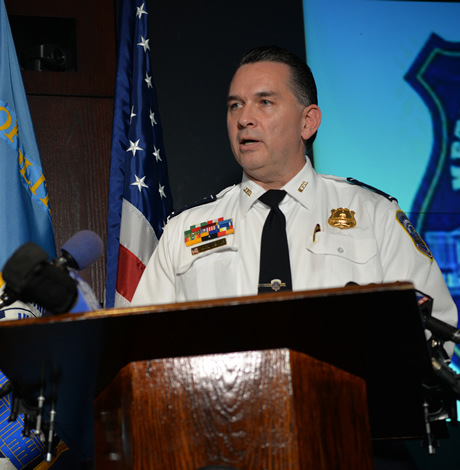
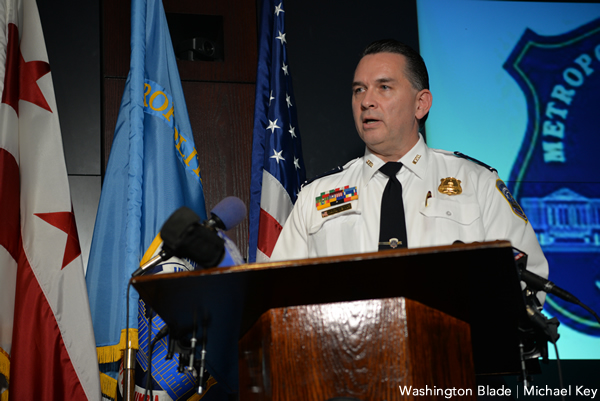
‘One of the things … beneficial to us in cold cases in particular is to highlight those cases again with the information we do have out to the public,’ said D.C. Police Chief Peter Newsham. (Washington Blade file photo by Michael Key)
Transgender rights advocate Earline Budd for the past year has been urging D.C. police to consider disclosing “just a little more” information about six unsolved murders of transgender women that took place in D.C. since the year 2000.
In response to an inquiry from the Washington Blade, police have confirmed that the murders of four gay men since 2000 also remain unsolved, three in D.C. and one in Prince George’s County, Md.
D.C. police, meanwhile, point out that they have made arrests and closed six other murders of transgender women in the District since 2000.
Budd said she and others in the transgender community remain hopeful that witnesses or others who may have known the female transgender victims in the unsolved cases – all of whom were African American – might come forward with information to help police make an arrest.
The release of additional details about the victims or the circumstances surrounding the cases might jog the memory of someone who could provide investigators with an “important tip,” Budd said.
But the commander of the D.C. police Homicide Branch, Capt. Anthony Haythe, said that while he and the team of detectives working on the unsolved trans and gay murder cases welcome information from citizens, releasing further details about the cases could compromise their ongoing investigations.
“We typically do not release any information that’s intimate to the case or any very specific information,” he told the Washington Blade in an interview earlier this month.
“Those are the things we would not want to put out because there are perpetrators still out there and you’re actually giving them information and different things they can use as their defense if they are eventually caught and arrested,” he said.
He noted that police offer a reward of up to $25,000 to anyone providing information leading to the arrest and conviction for a murder case.
D.C. police are offering a reward of up to $50,000 for information leading to the arrest and conviction of the person or persons responsible for the double murder of transgender women Ukea Davis, 18, and Stephanie Thomas, 19, on Aug. 12, 2002.
In a development that shocked LGBT activists and city officials, an unidentified gunman fired multiple rounds from a semiautomatic weapon, execution style, into the upper body and head of the two women while they sat inside a car on the 4900 block of C Street, S.E. about 3:20 a.m.
Although at least one witness saw the shooting, police said they have no known motive or suspect in the case.
Haythe, meanwhile, reiterated a longstanding D.C. police policy of not disclosing the sexual orientation of homicide victims unless investigators obtain evidence showing that the murder was linked to the victim’s status as a gay or lesbian person.
Police spokesperson Rachel Schaerr Reid said the policy also calls for not disclosing the gender identity of a crime victim unless there is evidence to show there is a nexus between the crime and the person’s gender identity, such as in the case of a hate crime.
In the four unsolved murders of gay men in the D.C. area since 2000 – three in D.C. and one in Prince George’s County — police in the two jurisdictions did not disclose that the victims were gay.
The Blade learned about the gay male victims’ sexual orientation from friends and family members, some of whom spoke to the media.
According to police spokesperson Reid, investigators have classified only one of the unsolved trans or gay murder cases in D.C. since 2000 as a hate crime. That was the Aug. 26, 2009 murder of transgender woman Tyli’a ‘Nana Boo’ Mack, 21, who was stabbed to death on the street in the 200 block of Q Street, N.W. in broad daylight at 2:38 p.m.
A trans woman friend who was with Mack during the attack and who suffered non-fatal stab wounds from the same male assailant told friends the attacker called the two women anti-gay and possibly anti-trans names shortly before the attack.
Prince George’s County police have said the case occurring in that jurisdiction also has not been classified as a hate crime. P.G. police have said they have yet to determine a motive. That case involved the May 30, 2017 stabbing death of Matthew Mickens-Murrey, 26, who was found dead inside his apartment in a neighborhood just outside Hyattsville, Md.
Friends said Mickens-Murrey was last seen at the D.C. gay bar Nellie’s during the Memorial Day weekend after attending events related to D.C. Black Pride that same weekend.
All but one of the gay male victims was African American. One of the gay victims, Gaurav Gopalan, 35, who was found dead Sept. 10, 2011 on a sidewalk in the 2600 block of 11th Street, N.W. about 5:20 a.m., was a native of India. Police said the cause of death was blunt force trauma to the head.
Devin Barrington-Ward, president of Impulse Group D.C., a local organization that provides entertainment and AIDS education services for black gay men, said Mickens-Murrey was a regular participant of the group’s events and friends with several of its members.
Barrington-Ward said he is especially troubled that virtually all of the unsolved murder cases involved victims who were people of color.
“Many of us feel very strongly that if these victims were white, that their cases would be solved and their killers brought to justice,” he said.
“D.C. area police could do a much better job of publicizing these murder cases and the rewards for information that could lead to arrest and conviction of those responsible,” Barrington-Ward said. Police, among other things, “could be using social media and dating apps like Jack’d and Grindr to get the word out about these unsolved cases,” he continued.
“There needs to be respectful and lawful engagement by the police with LGBTQ people of color to secure justice in these cases,” he said.
He said he was also troubled that local and national LGBT organizations for the most part haven’t spoken out aggressively enough, if at all, about the unsolved gay and trans murders and whether police were doing enough to solve the cases.
David Mariner, executive director of the D.C. Center for the LGBT Community, said the Center has posted police fliers in the center’s office that have announced nearly all of the unsolved gay and trans murders and that include photos of the victims. But the Center’s D.C. Anti-Violence Project, which works to curtail anti-LGBT violence in the city, has not released a public statement to draw attention to the unsolved murders, a development that Barrington-Ward says is indicative of the apparent failure of most LGBT organizations to respond to the murders.
Arrests made in 6 trans murders
D.C. police spokesperson Schaerr Reid told the Blade that the Homicide Branch secured arrests in six transgender murders that occurred in D.C. since the year 2000. Five of the victims in those cases were African-American trans women and one was a Latina transgender woman.
The only known gay-related murder in D.C. since 2000 that police have closed involved the widely publicized stabbing death of D.C. attorney David Messerschmitt, 30, in his room at the upscale Donovan Hotel on Feb. 9, 2015.
Messerschmitt, who was white, was married to a woman who reported him missing when he didn’t return home after spending the day at his law office. Court records show that police found through their investigation that he posted an ad on a gay male hookup site seeking a male sex partner and rented the hotel room to engage in what he thought would be a gay tryst after he got off work and before returning home to his wife.
The investigation found that a 21-year-old D.C. woman named Jamyra Gallmon answered the ad by pretending she was a man and made arrangements to meet Messerschmitt for sex at his hotel room. A police arrest affidavit filed in court says Gallmon and her girlfriend, Dominique Johnson, 19, conspired to arrange for Gallmon to rob Messerschmitt.
Following her arrest, Gallmon pleaded guilty to second-degree murder and confessed to having stabbed Messerschmitt when he “fought back” at the time she attempted to rob him. Police said Gallmon stabbed Messerschmitt seven times – in the abdomen, groin and heart. She was sentenced to 24 years in prison. Johnson, who pleaded guilty to conspiracy to commit robbery, was sentenced to six months in jail.
Police have not officially listed the Messerschmitt murder as a gay case, raising concern among some activists that police may be downplaying the longstanding phenomenon of gay “pickup” murders.
Law enforcement experts in D.C. and other cities have said such murders are not hate crimes but crimes of opportunity in which a perpetrator targets a gay man for robbery by pretending to be interested in sex as a means of getting invited to the victim’s home or other meeting place. Such schemes sometimes result in a murder like the Messerschmitt case, law enforcement experts familiar with those cases have said.
D.C. Police Chief Peter Newsham, when asked about the unsolved trans and gay cases at a news conference last month, said the department routinely seeks to continue to release information about unsolved cases that had been released at the time the murders occurred.
“One of the things that are very beneficial to us in cold cases in particular is to highlight those cases again with the information we do have out to the public,” he said. “Because that can spur a memory or somebody may be in a different position in their life when they see that information and come forward now where they may not have otherwise done that,” Newsham said.
Homicide Branch commander Haythe said the unsolved gay and trans cases that are four years old or older are classified as “cold” cases. He said most of them are being investigated by Detective Danny Whalen, who is known as an experienced investigator who is highly knowledgeable on LGBT-related cases.
‘Tragic, heartbreaking, chilling’
In nearly all of the unsolved and solved murder cases of transgender women in D.C. since 2000, police have identified them by their male birth names, with their female names placed in quotation marks or parentheses. This practice has troubled transgender activists, who say using a birth name is disrespectful to the victims because it mischaracterizes the gender to which they identified and lived.
Police in the past have said using the birth name and changed name when known could be helpful to their investigation into crimes against transgender people because potential witnesses may only have known the victim by their birth name.
Harper Jean, director of policy for the National Center for Transgender Equality, said her organization is glad that D.C. police are continuing to take steps to solve the transgender murders. But she called the police handling of the trans victims’ named in the police reward fliers “an unfortunate step” that undermines efforts to build trust in the transgender community.
“The problem is the way in which they use somebody’s old name and their adopted name using AKAs, parentheses or quotation marks for their adopted name,” Jean said. “Even if somebody was never able to legally change their name, treating their old male name as real in this way and their adopted female name as an alias or nickname, as these fliers suggest, invalidates their very identity.”
Jean didn’t rule out the police use of a trans person’s old name for investigative purposes. But she said it would be more respectful to the victims and the trans community if police stated in their fliers or other literature that the victim was formerly known as or formerly went by another name and this is that other name rather than characterizing the new name as an alias.
Guillaume Bagal, president of the D.C. Gay and Lesbian Activists Alliance, said GLAA has closely monitored and spoken out on LGBT-related murders in the city for many years. He said the unsolved cases since 2000 raise questions about police handling of the cases.
“These murders are tragic, heartbreaking, chilling, and frustrating in part due to the difficulty getting witnesses,” Bagal said. “But the policy of not disclosing the sexual orientation or gender identity of victims makes the task that much harder,” he said.
Bagal praised D.C. Police Chief Newsham and the department’s LGBT Liaison Unit for being “helpful and accessible” to concerns of the LGBT community. But he called on the department to respond to the unsolved gay and trans murder cases as well as the increase in anti-LGBT hate crimes reported in the city by, among other things, acknowledging “the sexual and gender minority status of the victims.”
This may not be a comprehensive list since police do not disclose sexual orientation and gender identity in all murder cases.
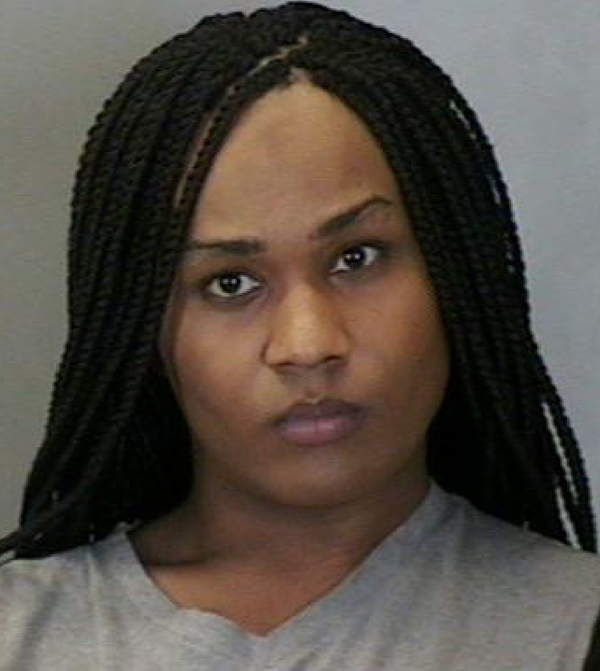
Tyra Henderson
Tyra Henderson, 22
Beaten to death April 23, 2000
Rear of 3600 block of 11th Street, N.W.
Reward up to $25,000 offered by police
According to D.C. police, at approximately 6:26 a.m. on Sunday, April 23, 2000, 22-year-old Tyra Henderson, a transgender woman, was found beaten to death in an alley behind the 3600 block of 11th Street, N.W.
Police have released little additional information. A Washington Post story on April 29, 2000 reported that Henderson lived at the time on the 1700 block of T Street, S.E.
The Post reported that someone filed a complaint against the police and sought help from the ACLU of the National Capital Area over an allegation that police took too long to respond to a 911 call at 2:20 a.m. that someone was moaning in the alley where Henderson was found unconscious. A police spokesperson told the Post police were investigating the complaint.
In a December 2006 report on murders of transgender people in the decade from 1996 to 2006, the Gender Public Advocacy Coalition, known as Gender PAC, said Henderson had been involved in sex work.
Transgender activists have said widespread anti-trans discrimination and bias often forces trans women to engage in sex work as a means of survival.
Anyone with information about the case is asked to contact D.C. homicide detective Daniel Whalen at 202-277-9225 or the police Command Information Center at 202-727-9099. Anonymous tips can be sent by text message to 50411.
Similar to all of the unsolved murder cases profiled in this report, police are offering a reward of up to $25,000 for information leading to an arrest and conviction of the perpetrator or perpetrators responsible for the murder of each victim.
More information here.
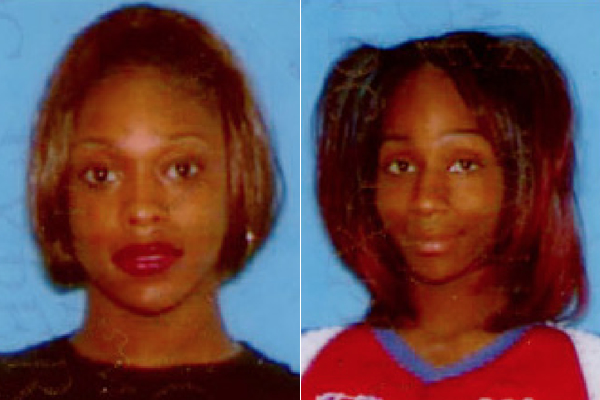
From left, Ukea Davis and Stephanie Thomas
Ukea Davis, 18, and
Stephanie Thomas, 19
Both shot to death Aug. 12, 2002
4900 block of C Street, S.E.
Reward up to $50,000 offered by police
In a development that shocked LGBT activists and city officials, transgender women Ukea Davis, 18, and her good friend Stephanie Thomas, 19, died in a hail of bullets fired by an as-yet-unidentified attacker while they sat inside Thomas’s car along the 4900 block of C Street, S.E.
Police said the incident occurred about 3:20 a.m. on Aug. 12, 2002. People familiar with the incident, including Thomas’s mother, Queen Washington, who was supportive of Thomas, said the shooting took place a short distance from Thomas’s apartment and where Davis lived as her roommate.
Sources familiar with the incident said the two teens were shot at last 10 times each by someone who pulled up next to them in a car and who appeared to have used a semiautomatic weapon.
The sources said Thomas and Davis told friends around 11:30 p.m. on the night of the murders that they were going to a nearby convenience store, possibly to a gas station, to buy cigarettes. Police have not said publicly if they learned whether the two teens had an encounter or altercation with someone at the convenience store or someplace else. But at least one witness reportedly saw a car pull up to Thomas’s car at the corner of 50th and C Streets, S.E. and fire a gun multiple times at Thomas and Davis as they sat in Thomas’s car.
According to an account of the incident by the Southern Poverty Law Center’s Winter of 2003 edition of its publication Intelligence Report, which focused on anti-transgender violence nationwide, an eyewitness told police a second car approached Thomas’s car after the initial shooting. The witness reported that a man got out of the second car and walked to Thomas’s car and saw that Davis appeared dead.
“When the man nudged Thomas’s shoulder to see if she was still alive, she moaned in confirmation,” the witness reportedly said. “But her helper fled as the first car returned,” the SPLC’s Intelligence Report says. “The gunman got out and fired more shots, making sure Thomas was dead.”
Washington, Thomas’s mother, told news media outlets that Thomas’s transition into a young woman several years earlier in a neighborhood a short distance from where the shooting occurred drew the attention of nearby residents who knew her and her family. Washington said while many accepted Thomas’s transition, others, including kids at the school Thomas attended, taunted and sometimes assaulted Thomas, prompting Thomas to quit high school before graduating.
LGBT activists organized a vigil at the site of the murders to honor the two slain trans teens and to draw attention to what they called an alarming number of instances of anti-transgender violence in D.C. around that time. Among those who attended and spoke at the vigil were then-D.C. Mayor Anthony Williams and D.C. Congressional Del. Eleanor Holmes Norton.
Many of the LGBT activists participating in the vigil said they considered the double murder a hate crime. But D.C. police, more than 15 years after the incident, say they don’t have sufficient evidence to classify the case as a hate crime and have yet to determine a motive for the killings.
Homicide Detective Daniel Whalen, a “cold case” and LGBT case expert, continues to work on the case, according to Acting Capt. Anthony Haythe, who serves as commander of the police Homicide Branch. Anyone with information about the case should contact Whalen at 202-277-9225.
More information here.
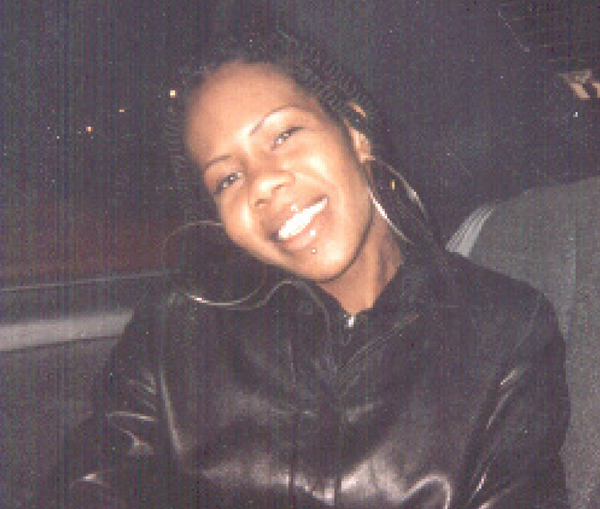
Elexuis Woodland
Elexuis Woodland, 23
Shot to death Dec. 2, 2005
2000 block of Savannah Terrace, S.E.
Reward up to $25,000 offered by police
D.C. police say transgender woman Elexuis Woodland, 23, a hairstylist, was fatally shot during a botched robbery that took place about 1:20 a.m. on Dec. 2, 2005 as Woodland and a male friend were walking home after purchasing food from a carryout store.
According to a police account, a gunman got out of a light blue American made car, possibly a Buick or Oldsmobile, that pulled up next to them and demanded money. Police said Woodland and the friend didn’t have any cash and the “robbery plan went haywire,” the Washington Post reported. The gunman shot and killed Woodland and shot and wounded the friend, who survived the attack.
A police flier seeking information about the incident includes an artist’s drawing of a suspect based on the description of the friend. The suspect is described as a black male in his 20s said to be 5 feet 11 inches to 6 feet tall, weighing 160-170 pounds, with a slight mustache and hair in plats or dreads.
The police flier also includes a photo of a car said to be the identical make and model from which the unknown suspect emerged.
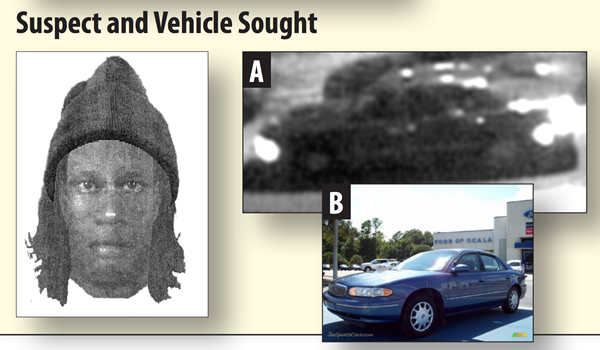 In a profile of Woodland, the Post reports that she began transitioning as a woman at the age of 19 and was accepted by her family, which is related to Calvin Woodland Sr., Elexuis Woodland’s grandfather. Calvin Woodland was a former boxer who for many years dedicated his life to helping young people in D.C.’s sometimes troubled neighborhoods. He died of natural causes in 2000.
In a profile of Woodland, the Post reports that she began transitioning as a woman at the age of 19 and was accepted by her family, which is related to Calvin Woodland Sr., Elexuis Woodland’s grandfather. Calvin Woodland was a former boxer who for many years dedicated his life to helping young people in D.C.’s sometimes troubled neighborhoods. He died of natural causes in 2000.
The Post profile says Elexuis, whose original surname was Tolliver, changed her last name to Woodland in honor of her grandfather.
Anyone with information about the case is asked to contact homicide Detective Daniel Whalen, the cold case specialist, at 202-277-9225.
More information here.
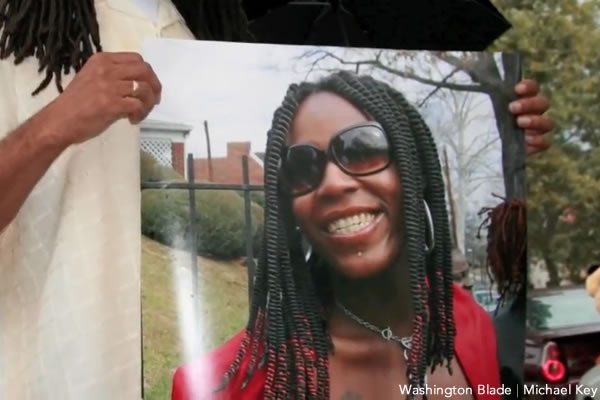
Tyli’a ‘Nana Boo’ Mack (Washington Blade file photo by Michael Key)
Tyli’a ‘Nana Boo’ Mack, 21
Stabbed to death Aug. 26, 2009
200 block of Q Street, N.W.
Reward up to $25,000 offered by police
LGBT activists have said they are especially concerned that the Aug. 26, 2009 murder of transgender woman Tyli’a ‘Nana Boo’ Mack, 21, remains unsolved because it occurred in broad daylight in a busy section of the city’s Shaw neighborhood where many people were on nearby streets and sidewalks.
D.C. police have classified Mack’s murder as a hate crime, according to police spokesperson Rachel Schaerr Reid. It’s the only one of the six unsolved trans murder cases and the four unsolved gay male murders featured in this story to be listed as a hate crime.
Police have said an unidentified male assailant fatally stabbed Mack on the 200 block of Q Street, N.W., about 2:38 p.m. as she was walking with a transgender female friend. People who knew the two women said they were walking to the nearby offices of the transgender advocacy and services group Transgender Health Empowerment (THE). The attacker also stabbed the friend, but her wounds, while serious, were not life threatening and she has fully recovered.
Longtime D.C. transgender rights advocate Earline Budd, who at the time worked for THE, said the friend later told her that the incident began when the friend and Mack were laughing about something as they walked past what appeared to be a child daycare center operating out of a townhouse.
According to Budd, the friend reported that a man standing in the doorway of the townhouse apparently thought that Mack and her friend were laughing at him, and he took offence. He shouted at the two trans women and called them derogatory names, possibly anti-gay names. Mack may have yelled back at him before the friend persuaded Mack to quickly walk away and continue on to the THE office.
But a short time later, Budd recalls the friend telling her, the man appeared behind Mack and appeared to have begun hitting Mack. When the friend shouted at the man to leave Mack alone he rushed over to the friend and started “hitting her,” Budd recalls the friend as saying. Seconds later the friend realized the man had stabbed her and Mack. Mack then ran along the street calling for help before she collapsed and soon lost consciousness, Budd recounted the friend as telling her.
Among those responding to the scene after police were called was then acting Lt. Brett Parson, who at the time served as director of the police Gay and Lesbian Liaison Unit.
Mack was taken to Howard University Hospital, where she was pronounced dead a short time later, police said.
Budd said the friend told her she never got a good look at the attacker because she wanted to avoid a confrontation when the unidentified man acted in a hostile way toward her and Mack. Although police have declined to comment on why they haven’t released a drawing of the attacker in the Mack murder case, Budd said the friend’s claim that she couldn’t provide a detailed description of him might be one reason why police haven’t released an artist’s drawing of a suspect as they have in other unsolved trans murder cases.
Mack’s mother, Beverlyn Mack, was among those who spoke at a news conference and later at a vigil organized by LGBT activists to draw attention to Mack’s unsolved case.
“My child was born like everyone else – through a mother’s womb,” she said. “And I don’t think it’s fair for other people to take other people’s lives.”
Similar to other unsolved trans murder cases, police are asking anyone with information that may help them identify and apprehend a suspect in the Mack case to contact homicide Det. Daniel Whalen at 202-277-9225.
More information here.
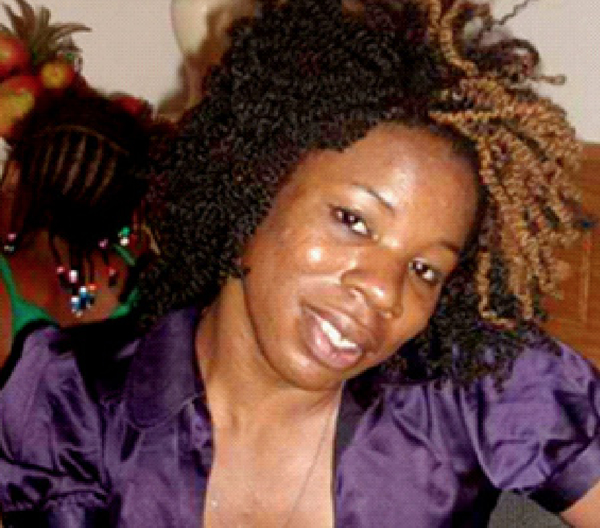
Lashay McLean
Lashay Mclean, 23
Shot to death July 20, 2011
6100 block of Dix Street, N.E.
Reward up to $25,000 offered by police
D.C. police say transgender woman Lashay Mclean, 23, was found suffering from a gunshot wound in the 6100 block of Dix Street, N.E., at approximately 4:26 a.m. on Wednesday, July 20, 2011. She was pronounced dead a short time later at a nearby hospital.
Then Deputy D.C. Police Chief Diane Grooms told LGBT activists at a vigil held for Mclean July 23 at the site of the murder that homicide detectives were pursuing information provided by a witness that the fatal shooting took place shortly after two unidentified males “had some words” with Mclean in an alley shortly before she was shot.
“The motive is still not clear to us,” Grooms told the Blade after the vigil. She said that in the early stage of the investigation police had not found evidence for either a robbery or a hate crime. Now, more than six years later, police have not disclosed whether they have identified a motive or suspect in the case, only that the case remains open.
The location where Mclean was shot was well known at the time as a gathering place for transgender sex workers and the men that patronize their services. Mclean’s friends and some family members who attended the vigil acknowledged that she had been arrested the previous year on a misdemeanor charge of solicitation for prostitution at the unit block of K Street, N.E., which is also known as a location where trans sex workers congregate. Grooms, however, said investigators at the time had no evidence that the murder was prostitution related.
Transgender activists, meanwhile, expressed concern that at the time police first publicly announced Mclean’s murder they identified her in an official press release by her male birth name and did not mention the victim was a transgender woman. However, the police Special Liaison Division, which at the time had jurisdiction over the then Gay and Lesbian Liaison Unit, disclosed that Mclean was a trans woman in emails it sent to community activists, including LGBT activists.
A police spokesperson told the Blade at the time that the decision not to publicly announce that Mclean was transgender was based on the department’s longstanding policy of not disclosing the sexual orientation or gender identity of a crime victim unless they have evidence that those characteristics are related to the crime.
The D.C. Trans Coalition, which was among the groups that organized the vigil for Mclean, said Mclean was a friend to many people in the LGBT community, including several D.C. Trans Coalition organizers. Mclean’s mother and several other family members attended the vigil for Mclean and said she was loved and cherished by her family.
Police say anyone with information that could help police identify a suspect should contact Det. Daniel Whalen at 202-277-9225 or the police command information center at 202-727-9099.
More information here.
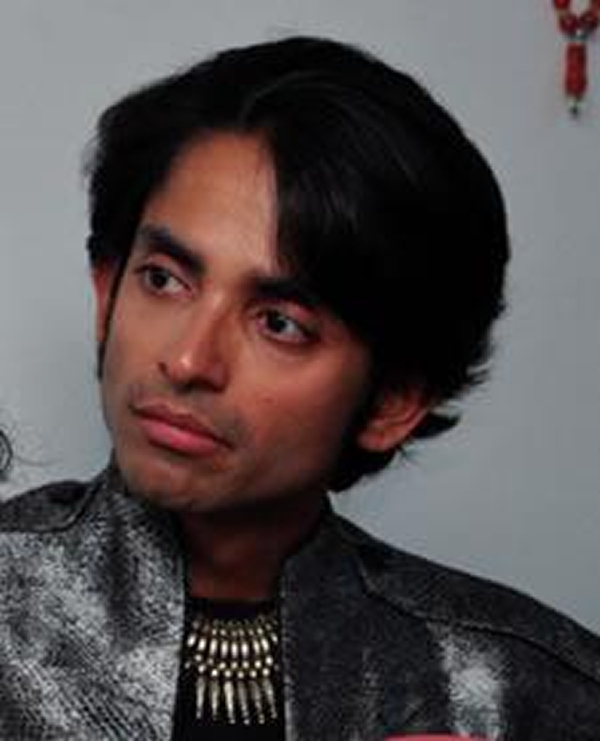
Gaurav Gopalan (Photo courtesy Facebook)
Gaurav ‘GiGi’ Gopalan, 35
Sept. 10, 2011
2600 block of 11th Street, N.W.
Blunt force trauma to head
Reward up to $25,000 offered by police
Gaurav Gopalan, 35, an aerospace engineer and highly acclaimed local theater director, was found dead on the sidewalk in the 2600 block of 11th Street, N.W., about 5:20 a.m. on Saturday, Sept. 10, 2011.
Friends and Bob Shaeffer, his partner of nearly five years, said he identified as a gay man over the many years they knew him. But police said when he was found unconscious on the sidewalk a short distance from his home in the Columbia Heights neighborhood, he was dressed in women’s clothes and appeared to have been carrying a pair of women’s high heel shoes.
With no identification documents found in his possession, it took police several days to track down his identity. And with no obvious signs of trauma or injury, it took authorities nearly two weeks to determine from an autopsy that the cause of death was blunt force trauma to the head. The city’s Medical Examiner ruled the death a homicide.
Police said Gopalan’s car, a gold-silver 2007 BMW 2-door sedan with a NASA sticker on the rear bumper, was seen being driven after his death. Police said it was later recovered and investigators were hoping to talk to anyone who may have seen the car during the weekend of Sept. 10-11, 2011.
Shaeffer told the Washington City Paper that on the Friday night prior to Gopalan’s murder early Saturday morning he told Shaeffer he planned to go out to some of the straight clubs on U Street, N.W. Police have said they obtained video of someone appearing to be Gopalan walking along U Street from surveillance cameras in that area. But they said employees of some of the bars in the area could not recall whether he had been to their establishments. The gay bars Town and Nellie’s are in that area.
Similar to nearly all of the unsolved murders of LGBT people since the year 2000, police told the Blade last week the case remains open and has been assigned to the Homicide Branch’s Cold Case Squad. Police have not disclosed whether they have determined a motive or identified a potential suspect in the case.
In the last months of his life Shaeffer and others who knew Gopalan said he began dressing occasionally in women’s clothes and said he was going by the name of Gigi during times when he took on a female persona.
D.C. transgender activist Earline Budd, who said she has spoken to some people who knew Gopalan, believes Gopalan may have been in the early stages of transitioning as a transgender woman. Regardless of what Gopalan’s actual gender identity was, Budd said she’s concerned that the beloved engineer and Shakespeare theater director may have been targeted because of the perception that he was a transgender woman at a time when trans women had been subjected to violent attacks in D.C.
His murder took place less than two months after transgender woman Lashay Mclean was shot to death on Dix Street, N.E. and less than a year after trans woman Tyli’a Nana Boo Mack was stabbed to death in the city’s Shaw neighborhood.
More than 200 people turned out for a vigil in Dupont Circle two weeks after his death to honor Gopalan and his life’s accomplishments. At the conclusion of the vigil participants carrying photos of Gopalan walked from Dupont Circle to the site of his murder in Columbia Heights, placing fliers and photos of him next to the sidewalk.
Anyone who may have any information that could be helpful to the investigation into Gopalan’s death is asked to contact the D.C. police Homicide Branch at 202-645-3421 or the police command information center at 202-727-9099.
More information here.
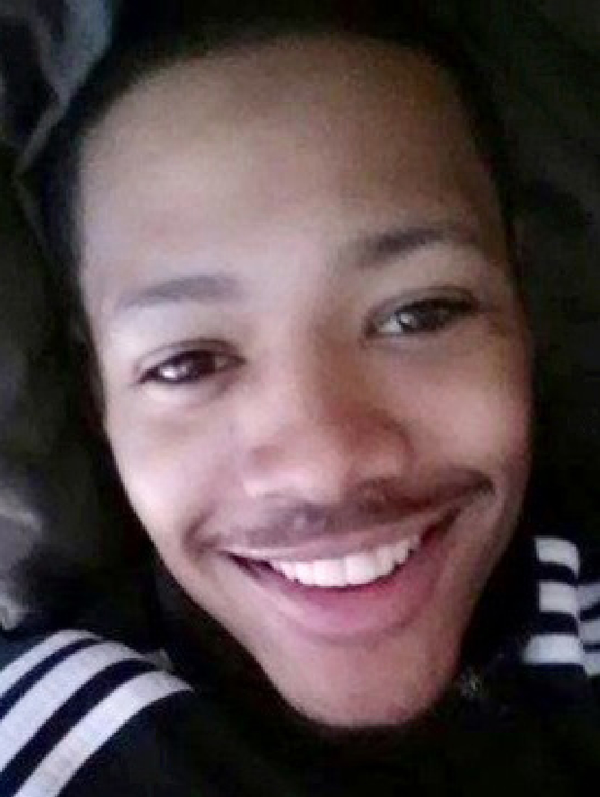
Demencio Lewis
Demencio Lewis, 23
Shot to death March 13, 2014
2500 block of Sayles Place, S.E.
Reward up to $25,000 offered by police
Demencio Lewis, 23, an aspiring model, actor and rapper, was shot to death in a hail of gunfire about 11:57 p.m. on Thursday, March 13, 2014, in the 2500 block of Sayles Place, S.E., according to a D.C. police announcement of his murder.
Police said later that a witness saw four men wearing hooded sweatshirts leaving the scene of the shooting in a black Hyundai Sonata. Lewis’s mother, Sharita Lewis, told Fox 5 News that she and her son were dining together when Demencio Lewis received a call on his cell phone from someone named Chris, who was waiting to see him outside his home.
He told his mother he needed to talk to Chris and he would be right back, Fox 5 News reported. Within minutes, D.C. police officers responded to the 2600 block of Sayles Place, S.E. and found Lewis lying unconscious on the street. His mother told Fox 5 he had been shot 27 times.
She also told the TV news station that she and other members of her family believe Lewis’s status as an openly gay man may have had something to do with his death. Among other things, the family members think he was lured into a trap and killed.
Sharita Lewis told Fox 5 her son was killed at a time when he and his loved ones expected him to excel in his chosen fields of modeling and acting as well as writing.
“He was talented,” the news station quoted her as saying. “He was all over the place and then he started acting,” she said. “He was on ‘The Good Wife,’ ‘Ugly Betty,’ ‘106 & Park,’ so he did a lot of stuff.”
D.C. police Homicide Branch commander Anthony Haythe said the Lewis case remains under active investigation by the homicide detectives that worked on the case from the time the murder occurred.
Anyone with information about case is asked to contact Det. Anthony Green at 202-607-8268 or Det. Gabriel Truby at 202-270-1202. The department’s command center number, which serves as a tip line, can also be reached at 202-727-9099.
More information here.
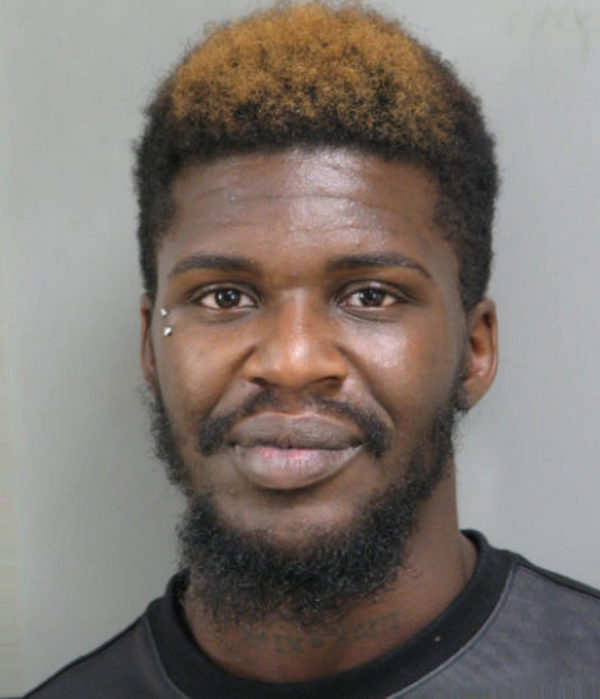
Stephon Marquis Perkins
Stephon Marquis Perkins, 21
Shot to death June 25, 2015
16th and Galen Streets, S.E.
Reward up to $25,000 offered by police
D.C. police have released few details about this case other than that Stephon Marquis Perkins, 21, was found suffering from a fatal gunshot wound near the intersection of 16th Street and Galen Street, S.E. about 3:44 a.m. on Thursday, June 25, 2015.
An employee of the D.C. LGBT community services center Casa Ruby, who identified herself only as Molly H., told the Blade that she and Perkins were close friends and that Perkins identified as gay.
“He was almost like family,” she said. “He was a kind, open-hearted person. He could be the life of the party.”
Police said that Perkins, a Maryland resident, was taken to a nearby hospital, where he was pronounced dead. A police source said the cause of death appeared to be a gunshot wound to the head.
The source, who spoke on condition of not being identified, said there was no evidence in the early stage of the investigation that the murder was a hate crime. The source said homicide detectives investigating the case spoke to Perkins’ boyfriend and consulted with the department’s Gay and Lesbian Liaison Unit as part of their investigation into the murder.
Similar to the Lewis case, the Perkins case is considered active and current and is being investigated by detectives familiar with the case from the time the incident occurred. They can be reached at 202-645-9600. Tips can be left with the command center at 202-727-9099.
More information here.
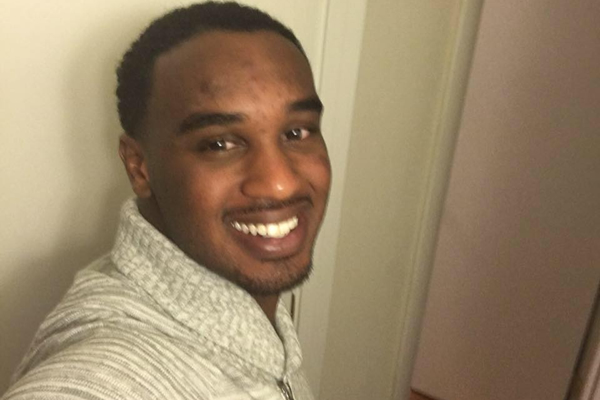
Matthew Mickens-Murrey
Matthew Mickens-Murrey, 26
Stabbed to death May 30, 2017
5400 block of Newton Street, Hyattsville, Md.
Reward up to $25,000 offered by police
Prince George’s County, Md., police have said Matthew Mickens-Murrey, 26, was found stabbed to death inside his apartment in the 5400 block of Newton Street in an unincorporated section of the county just outside Hyattsville.
Friends and family members said Mickens-Murrey’s boss at a firm where he worked as a security guard in D.C. called P.G. County police after Mickens-Murrey didn’t show up for work. A P.G. County police statement says officers arrived at his residence about 2:40 p.m. on May 30 and found him unconscious and “suffering from trauma.” It says he was pronounced dead at the scene.
Mickens-Murrey’s mother and sister, who live in Pennsylvania, told the Washington Blade at a birthday celebration in Mickens-Murrey’s honor in D.C. on Nov. 9 that investigators told them he had been stabbed multiple times. They said police told them there were no signs of a forced entry into the apartment, leading police to believe he knew his attacker and most likely invited that person to his home.
Friends said that on the weekend preceding the murder, Mickens-Murrey had attended events associated with D.C. Black Pride, which takes place each year over the Memorial Day weekend. One of his friends, Devin Barrington-Ward, president of Impulse Group D.C., which organizes events catering to black gay men, said Mickens-Murrey was an active participant in the group’s activities.
At least one friend said Mickens-Murrey was last seen around 9 or 10 p.m. Sunday night, May 28, at the D.C. gay bar Nellie’s. The friend, Terrance Ford, said he and Mickens-Murrey also would sometimes visit the Dupont Circle area gay bars Fireplace and Cobalt and the Capitol Hill gay bar Bachelor’s Mill.
Prince George’s County Police Chief Hank Stawinski, who attended a memorial service for Mickens-Murrey, told the gathering that his investigators were pursuing excellent leads in the case.
“We do not believe this is random and we do not believe he was targeted because of his lifestyle,” Stawinski told ABC7 News.
A P.G. County police spokesperson said it would be inappropriate for police to release specific details of the investigation, including whether they were looking into the possibility that Mickens-Murrey met his killer at a gay meeting place such as a gay bar or through an online hookup site.
Anyone with information about the case is asked to contact police at HYPERLINK “tel:(301)%20772-4925”301-772-4925.
homepage news
Honoring the legacy of New Orleans’ 1973 UpStairs Lounge fire
Why the arson attack that killed 32 gay men still resonates 50 years later

On June 23 of last year, I held the microphone as a gay man in the New Orleans City Council Chamber and related a lost piece of queer history to the seven council members. I told this story to disabuse all New Orleanians of the notion that silence and accommodation, in the face of institutional and official failures, are a path to healing.
The story I related to them began on a typical Sunday night at a second-story bar on the fringe of New Orleans’ French Quarter in 1973, where working-class men would gather around a white baby grand piano and belt out the lyrics to a song that was the anthem of their hidden community, “United We Stand” by the Brotherhood of Man.
“United we stand,” the men would sing together, “divided we fall” — the words epitomizing the ethos of their beloved UpStairs Lounge bar, an egalitarian free space that served as a forerunner to today’s queer safe havens.
Around that piano in the 1970s Deep South, gays and lesbians, white and Black queens, Christians and non-Christians, and even early gender minorities could cast aside the racism, sexism, and homophobia of the times to find acceptance and companionship for a moment.
For regulars, the UpStairs Lounge was a miracle, a small pocket of acceptance in a broader world where their very identities were illegal.
On the Sunday night of June 24, 1973, their voices were silenced in a murderous act of arson that claimed 32 lives and still stands as the deadliest fire in New Orleans history — and the worst mass killing of gays in 20th century America.
As 13 fire companies struggled to douse the inferno, police refused to question the chief suspect, even though gay witnesses identified and brought the soot-covered man to officers idly standing by. This suspect, an internally conflicted gay-for-pay sex worker named Rodger Dale Nunez, had been ejected from the UpStairs Lounge screaming the word “burn” minutes before, but New Orleans police rebuffed the testimony of fire survivors on the street and allowed Nunez to disappear.
As the fire raged, police denigrated the deceased to reporters on the street: “Some thieves hung out there, and you know this was a queer bar.”
For days afterward, the carnage met with official silence. With no local gay political leaders willing to step forward, national Gay Liberation-era figures like Rev. Troy Perry of the Metropolitan Community Church flew in to “help our bereaved brothers and sisters” — and shatter officialdom’s code of silence.
Perry broke local taboos by holding a press conference as an openly gay man. “It’s high time that you people, in New Orleans, Louisiana, got the message and joined the rest of the Union,” Perry said.
Two days later, on June 26, 1973, as families hesitated to step forward to identify their kin in the morgue, UpStairs Lounge owner Phil Esteve stood in his badly charred bar, the air still foul with death. He rebuffed attempts by Perry to turn the fire into a call for visibility and progress for homosexuals.
“This fire had very little to do with the gay movement or with anything gay,” Esteve told a reporter from The Philadelphia Inquirer. “I do not want my bar or this tragedy to be used to further any of their causes.”
Conspicuously, no photos of Esteve appeared in coverage of the UpStairs Lounge fire or its aftermath — and the bar owner also remained silent as he witnessed police looting the ashes of his business.
“Phil said the cash register, juke box, cigarette machine and some wallets had money removed,” recounted Esteve’s friend Bob McAnear, a former U.S. Customs officer. “Phil wouldn’t report it because, if he did, police would never allow him to operate a bar in New Orleans again.”
The next day, gay bar owners, incensed at declining gay bar traffic amid an atmosphere of anxiety, confronted Perry at a clandestine meeting. “How dare you hold your damn news conferences!” one business owner shouted.
Ignoring calls for gay self-censorship, Perry held a 250-person memorial for the fire victims the following Sunday, July 1, culminating in mourners defiantly marching out the front door of a French Quarter church into waiting news cameras. “Reverend Troy Perry awoke several sleeping giants, me being one of them,” recalled Charlene Schneider, a lesbian activist who walked out of that front door with Perry.

Esteve doubted the UpStairs Lounge story’s capacity to rouse gay political fervor. As the coroner buried four of his former patrons anonymously on the edge of town, Esteve quietly collected at least $25,000 in fire insurance proceeds. Less than a year later, he used the money to open another gay bar called the Post Office, where patrons of the UpStairs Lounge — some with visible burn scars — gathered but were discouraged from singing “United We Stand.”
New Orleans cops neglected to question the chief arson suspect and closed the investigation without answers in late August 1973. Gay elites in the city’s power structure began gaslighting the mourners who marched with Perry into the news cameras, casting suspicion on their memories and re-characterizing their moment of liberation as a stunt.
When a local gay journalist asked in April 1977, “Where are the gay activists in New Orleans?,” Esteve responded that there were none, because none were needed. “We don’t feel we’re discriminated against,” Esteve said. “New Orleans gays are different from gays anywhere else… Perhaps there is some correlation between the amount of gay activism in other cities and the degree of police harassment.”

An attitude of nihilism and disavowal descended upon the memory of the UpStairs Lounge victims, goaded by Esteve and fellow gay entrepreneurs who earned their keep via gay patrons drowning their sorrows each night instead of protesting the injustices that kept them drinking.
Into the 1980s, the story of the UpStairs Lounge all but vanished from conversation — with the exception of a few sanctuaries for gay political debate such as the local lesbian bar Charlene’s, run by the activist Charlene Schneider.
By 1988, the 15th anniversary of the fire, the UpStairs Lounge narrative comprised little more than a call for better fire codes and indoor sprinklers. UpStairs Lounge survivor Stewart Butler summed it up: “A tragedy that, as far as I know, no good came of.”
Finally, in 1991, at Stewart Butler and Charlene Schneider’s nudging, the UpStairs Lounge story became aligned with the crusade of liberated gays and lesbians seeking equal rights in Louisiana. The halls of power responded with intermittent progress. The New Orleans City Council, horrified by the story but not yet ready to take its look in the mirror, enacted an anti-discrimination ordinance protecting gays and lesbians in housing, employment, and public accommodations that Dec. 12 — more than 18 years after the fire.
“I believe the fire was the catalyst for the anger to bring us all to the table,” Schneider told The Times-Picayune, a tacit rebuke to Esteve’s strategy of silent accommodation. Even Esteve seemed to change his stance with time, granting a full interview with the first UpStairs Lounge scholar Johnny Townsend sometime around 1989.
Most of the figures in this historic tale are now deceased. What’s left is an enduring story that refused to go gently. The story now echoes around the world — a musical about the UpStairs Lounge fire recently played in Tokyo, translating the gay underworld of the 1973 French Quarter for Japanese audiences.
When I finished my presentation to the City Council last June, I looked up to see the seven council members in tears. Unanimously, they approved a resolution acknowledging the historic failures of city leaders in the wake of the UpStairs Lounge fire.
Council members personally apologized to UpStairs Lounge families and survivors seated in the chamber in a symbolic act that, though it could not bring back those who died, still mattered greatly to those whose pain had been denied, leaving them to grieve alone. At long last, official silence and indifference gave way to heartfelt words of healing.
The way Americans remember the past is an active, ongoing process. Our collective memory is malleable, but it matters because it speaks volumes about our maturity as a people, how we acknowledge the past’s influence in our lives, and how it shapes the examples we set for our youth. Do we grapple with difficult truths, or do we duck accountability by defaulting to nostalgia and bluster? Or worse, do we simply ignore the past until it fades into a black hole of ignorance and indifference?
I believe that a factual retelling of the UpStairs Lounge tragedy — and how, 50 years onward, it became known internationally — resonates beyond our current divides. It reminds queer and non-queer Americans that ignoring the past holds back the present, and that silence is no cure for what ails a participatory nation.
Silence isolates. Silence gaslights and shrouds. It preserves the power structures that scapegoat the disempowered.
Solidarity, on the other hand, unites. Solidarity illuminates a path forward together. Above all, solidarity transforms the downtrodden into a resounding chorus of citizens — in the spirit of voices who once gathered ‘round a white baby grand piano and sang, joyfully and loudly, “United We Stand.”

Robert W. Fieseler is a New Orleans-based journalist and the author of “Tinderbox: the Untold Story of the Up Stairs Lounge Fire and the Rise of Gay Liberation.”
homepage news
New Supreme Court term includes critical LGBTQ case with ‘terrifying’ consequences
Business owner seeks to decline services for same-sex weddings

The U.S. Supreme Court, after a decision overturning Roe v. Wade that still leaves many reeling, is starting a new term with justices slated to revisit the issue of LGBTQ rights.
In 303 Creative v. Elenis, the court will return to the issue of whether or not providers of custom-made goods can refuse service to LGBTQ customers on First Amendment grounds. In this case, the business owner is Lorie Smith, a website designer in Colorado who wants to opt out of providing her graphic design services for same-sex weddings despite the civil rights law in her state.
Jennifer Pizer, acting chief legal officer of Lambda Legal, said in an interview with the Blade, “it’s not too much to say an immeasurably huge amount is at stake” for LGBTQ people depending on the outcome of the case.
“This contrived idea that making custom goods, or offering a custom service, somehow tacitly conveys an endorsement of the person — if that were to be accepted, that would be a profound change in the law,” Pizer said. “And the stakes are very high because there are no practical, obvious, principled ways to limit that kind of an exception, and if the law isn’t clear in this regard, then the people who are at risk of experiencing discrimination have no security, no effective protection by having a non-discrimination laws, because at any moment, as one makes their way through the commercial marketplace, you don’t know whether a particular business person is going to refuse to serve you.”
The upcoming arguments and decision in the 303 Creative case mark a return to LGBTQ rights for the Supreme Court, which had no lawsuit to directly address the issue in its previous term, although many argued the Dobbs decision put LGBTQ rights in peril and threatened access to abortion for LGBTQ people.
And yet, the 303 Creative case is similar to other cases the Supreme Court has previously heard on the providers of services seeking the right to deny services based on First Amendment grounds, such as Masterpiece Cakeshop and Fulton v. City of Philadelphia. In both of those cases, however, the court issued narrow rulings on the facts of litigation, declining to issue sweeping rulings either upholding non-discrimination principles or First Amendment exemptions.
Pizer, who signed one of the friend-of-the-court briefs in opposition to 303 Creative, said the case is “similar in the goals” of the Masterpiece Cakeshop litigation on the basis they both seek exemptions to the same non-discrimination law that governs their business, the Colorado Anti-Discrimination Act, or CADA, and seek “to further the social and political argument that they should be free to refuse same-sex couples or LGBTQ people in particular.”
“So there’s the legal goal, and it connects to the social and political goals and in that sense, it’s the same as Masterpiece,” Pizer said. “And so there are multiple problems with it again, as a legal matter, but also as a social matter, because as with the religion argument, it flows from the idea that having something to do with us is endorsing us.”
One difference: the Masterpiece Cakeshop litigation stemmed from an act of refusal of service after owner, Jack Phillips, declined to make a custom-made wedding cake for a same-sex couple for their upcoming wedding. No act of discrimination in the past, however, is present in the 303 Creative case. The owner seeks to put on her website a disclaimer she won’t provide services for same-sex weddings, signaling an intent to discriminate against same-sex couples rather than having done so.
As such, expect issues of standing — whether or not either party is personally aggrieved and able bring to a lawsuit — to be hashed out in arguments as well as whether the litigation is ripe for review as justices consider the case. It’s not hard to see U.S. Chief Justice John Roberts, who has sought to lead the court to reach less sweeping decisions (sometimes successfully, and sometimes in the Dobbs case not successfully) to push for a decision along these lines.
Another key difference: The 303 Creative case hinges on the argument of freedom of speech as opposed to the two-fold argument of freedom of speech and freedom of religious exercise in the Masterpiece Cakeshop litigation. Although 303 Creative requested in its petition to the Supreme Court review of both issues of speech and religion, justices elected only to take up the issue of free speech in granting a writ of certiorari (or agreement to take up a case). Justices also declined to accept another question in the petition request of review of the 1990 precedent in Smith v. Employment Division, which concluded states can enforce neutral generally applicable laws on citizens with religious objections without violating the First Amendment.
Representing 303 Creative in the lawsuit is Alliance Defending Freedom, a law firm that has sought to undermine civil rights laws for LGBTQ people with litigation seeking exemptions based on the First Amendment, such as the Masterpiece Cakeshop case.
Kristen Waggoner, president of Alliance Defending Freedom, wrote in a Sept. 12 legal brief signed by her and other attorneys that a decision in favor of 303 Creative boils down to a clear-cut violation of the First Amendment.
“Colorado and the United States still contend that CADA only regulates sales transactions,” the brief says. “But their cases do not apply because they involve non-expressive activities: selling BBQ, firing employees, restricting school attendance, limiting club memberships, and providing room access. Colorado’s own cases agree that the government may not use public-accommodation laws to affect a commercial actor’s speech.”
Pizer, however, pushed back strongly on the idea a decision in favor of 303 Creative would be as focused as Alliance Defending Freedom purports it would be, arguing it could open the door to widespread discrimination against LGBTQ people.
“One way to put it is art tends to be in the eye of the beholder,” Pizer said. “Is something of a craft, or is it art? I feel like I’m channeling Lily Tomlin. Remember ‘soup and art’? We have had an understanding that whether something is beautiful or not is not the determining factor about whether something is protected as artistic expression. There’s a legal test that recognizes if this is speech, whose speech is it, whose message is it? Would anyone who was hearing the speech or seeing the message understand it to be the message of the customer or of the merchants or craftsmen or business person?”
Despite the implications in the case for LGBTQ rights, 303 Creative may have supporters among LGBTQ people who consider themselves proponents of free speech.
One joint friend-of-the-court brief before the Supreme Court, written by Dale Carpenter, a law professor at Southern Methodist University who’s written in favor of LGBTQ rights, and Eugene Volokh, a First Amendment legal scholar at the University of California, Los Angeles, argues the case is an opportunity to affirm the First Amendment applies to goods and services that are uniquely expressive.
“Distinguishing expressive from non-expressive products in some contexts might be hard, but the Tenth Circuit agreed that Smith’s product does not present a hard case,” the brief says. “Yet that court (and Colorado) declined to recognize any exemption for products constituting speech. The Tenth Circuit has effectively recognized a state interest in subjecting the creation of speech itself to antidiscrimination laws.”
Oral arguments in the case aren’t yet set, but may be announced soon. Set to defend the state of Colorado and enforcement of its non-discrimination law in the case is Colorado Solicitor General Eric Reuel Olson. Just this week, the U.S. Supreme Court announced it would grant the request to the U.S. solicitor general to present arguments before the justices on behalf of the Biden administration.
With a 6-3 conservative majority on the court that has recently scrapped the super-precedent guaranteeing the right to abortion, supporters of LGBTQ rights may think the outcome of the case is all but lost, especially amid widespread fears same-sex marriage would be next on the chopping block. After the U.S. Tenth Circuit Court of Appeals ruled against 303 Creative in the lawsuit, the simple action by the Supreme Court to grant review in the lawsuit suggests they are primed to issue a reversal and rule in favor of the company.
Pizer, acknowledging the call to action issued by LGBTQ groups in the aftermath of the Dobbs decision, conceded the current Supreme Court issuing the ruling in this case is “a terrifying prospect,” but cautioned the issue isn’t so much the makeup of the court but whether or not justices will continue down the path of abolishing case law.
“I think the question that we’re facing with respect to all of the cases or at least many of the cases that are in front of the court right now, is whether this court is going to continue on this radical sort of wrecking ball to the edifice of settled law and seemingly a goal of setting up whole new structures of what our basic legal principles are going to be. Are we going to have another term of that?” Pizer said. “And if so, that’s terrifying.”
homepage news
Kelley Robinson, a Black, queer woman, named president of Human Rights Campaign
Progressive activist a veteran of Planned Parenthood Action Fund

Kelley Robinson, a Black, queer woman and veteran of Planned Parenthood Action Fund, is to become the next president of the Human Rights Campaign, the nation’s leading LGBTQ group announced on Tuesday.
Robinson is set to become the ninth president of the Human Rights Campaign after having served as executive director of Planned Parenthood Action Fund and more than 12 years of experience as a leader in the progressive movement. She’ll be the first Black, queer woman to serve in that role.
“I’m honored and ready to lead HRC — and our more than three million member-advocates — as we continue working to achieve equality and liberation for all Lesbian, Gay, Bisexual, Transgender, and Queer people,” Robinson said. “This is a pivotal moment in our movement for equality for LGBTQ+ people. We, particularly our trans and BIPOC communities, are quite literally in the fight for our lives and facing unprecedented threats that seek to destroy us.”
The next Human Rights Campaign president is named as Democrats are performing well in polls in the mid-term elections after the U.S. Supreme Court overturned Roe v. Wade, leaving an opening for the LGBTQ group to play a key role amid fears LGBTQ rights are next on the chopping block.
“The overturning of Roe v. Wade reminds us we are just one Supreme Court decision away from losing fundamental freedoms including the freedom to marry, voting rights, and privacy,” Robinson said. “We are facing a generational opportunity to rise to these challenges and create real, sustainable change. I believe that working together this change is possible right now. This next chapter of the Human Rights Campaign is about getting to freedom and liberation without any exceptions — and today I am making a promise and commitment to carry this work forward.”
The Human Rights Campaign announces its next president after a nearly year-long search process after the board of directors terminated its former president Alphonso David when he was ensnared in the sexual misconduct scandal that led former New York Gov. Andrew Cuomo to resign. David has denied wrongdoing and filed a lawsuit against the LGBTQ group alleging racial discrimination.

-

 District of Columbia5 days ago
District of Columbia5 days agoNew D.C. LGBTQ+ bar Crush set to open April 19
-

 South America3 days ago
South America3 days agoDaniel Zamudio murderer’s parole request denied
-

 Maryland4 days ago
Maryland4 days agoMontgomery County police chief discusses arrest of trans student charged with planned school shooting
-

 Politics5 days ago
Politics5 days agoCourt records raise concerns about right-wing TikTok investor’s influence











